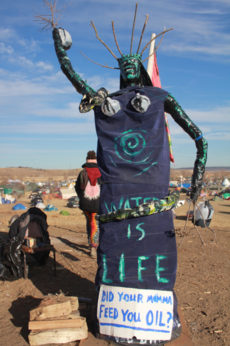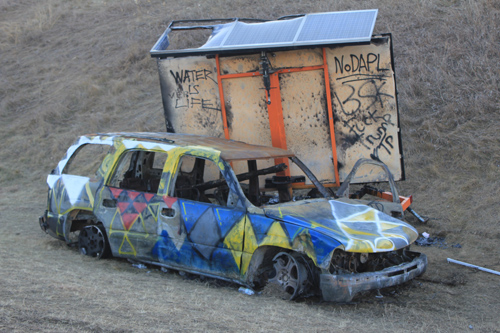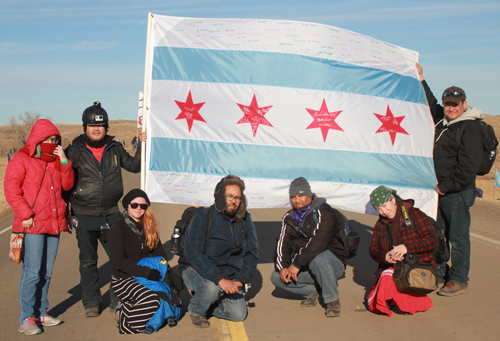
On December 4, the Army Corps of Engineers notified the Standing Rock Sioux tribe that the final permit for the Dakota Access Pipeline construction

had been denied. Without the permit for easement, the current route for the pipeline cannot continue without a full environmental impact statement. Supporters of the #NoDAPL movement around the world rejoiced in their victory, as many interpreted this mandate to be the final nail in the “black snake’s” coffin. But the oil corporations behind the pipeline project are already signaling they do not intend to walk away from the lucrative project.
Unfortunately, according to many Water Protectors (as the pipeline protesters call themselves), this announcement was nothing more than another administrative formality in a parade of broken promises to halt the pipeline. Natives communities and allies have long held on to hope that the Obama administration would step in and end the construction of the oil pipeline once and for all. Since as far back as September, the Department of Justice began releasing statements indicating that the administration would halt the construction process until they could determine whether it would “need to reconsider any of its previous decisions regarding the Lake Oahe site under the National Environmental Policy Act (NEPA) or other federal laws.”
The months following resulted in anything but a standstill, with a number of reported clashes between unarmed Water Protectors and militarized police forces. After a particularly aggressive confrontation with the Morton County Sheriff’s department November 20th left more than 160 people injured according to Jade Begay of the Indigenous Environmental Network, the National Lawyers Guild filed a class action lawsuit on behalf of eight Standing Rock protesters for excessive force. Reports of individuals being entrapped on Blackwater Bridge in near freezing temperatures, and hosed down with water cannons, made headlines across the nation. Sophia Wilansky, a 21-year-old woman from New York, nearly lost her arm after being struck with an explosive grenade and had to undergo multiple surgeries to salvage her limb. Vanessa Dundon, an indigenous woman from Standing Rock, was shot in the eye with a tear gas canister, after attempting to help get someone off the bridge, and now faces the possibility of permanent loss of vision in her right eye.
Several tribal leaders and allies at the Oceti Sakowin camp site (one of multiple encampments of Water Protectors at Standing Rock) celebrated the news of the Army Corps’ administrative decree, others were less hesitant to join in the festivities. A number of Water Protectors there have said they do not trust the recent announcement and the Obama administration’s attempts at reconciliation. Though Standing Rock Sioux Chairman Dave Archambault reportedly advised non-Sioux Water Protectors to leave the camp site, many have decided to stand their ground.
David “Vlow” Rodriguez, a Water Protector from Chicago, has been stationed at Standing Rock for several months. In a post made on Facebook he noted that he was not yet celebrating a victory. “We have had too many false victories at this point and I will not be considering this a win until I see the drill pad removed, their mercenaries sent home, and I walk upon Sacred Ground Camp once again. We have sacrificed and endured in defense of our rights. This isn’t just about stopping a pipeline, it’s about restoring the treaties.”

Leo “Gunner” Baker, a water protector from the Upper Sioux community in Granite Falls, Minn., agrees. “DAPL had stated they will not consider a reroute,” said Baker. “They are willing to continue work and pay a fine. They are also expecting Trump to overturn the decision.” Baker has been a leading voice at the Oceti Sakowin camp in Standing Rock. “Native American people have been marginalized for centuries,” he added. “This issue goes way beyond race. Race is only one component of the issue. Protecting sacred sites and sovereignty are very important, we are finally getting on that world stage for those issues.” He noted that the Native nations have a long history in dealing with faulty treaty negotiations with the U.S. “We don’t really trust that we will be protected,” Baker said. “Seeing is believing.”
Oil corporations Energy Transfer Partners and Sunoco Logistics Partners wasted no time in validating the doubts from the Standing Rock community. In a response to the Army Corps’ Dec. 4 announcement, the corporations released a statement of their own, stating they “are fully committed to ensuring that this vital project is brought to completion and fully expect to complete construction of the pipeline without any additional rerouting in and around Lake Oahe. Nothing this Administration has done today changes that in any way.”
These corporations that are responsible for building the Dakota Access pipeline insisted that the announcement was just another move in a series of “overt and transparent political actions by an administration which has abandoned the rule of law in favor of currying favor with a narrow and extreme political constituency.”
Despite the fact Morton County police have reportedly removed themselves from the Blackwater Bridge following the announcement, it seems that the

battle is not yet over. The decision to halt construction may have bought water protectors time to recharge, but it certainly is not the end of the ongoing battle against corporate oil giants. The Water Protectors say they have little hope for help from the incoming administration, as it was recently reported by Reuters that Trump’s advisors aim to privatize oil-rich Indian reservations. This would mean in order to gain access to oil, gas, and even coal reserves, the U.S. government would have to remove tribal land from public treatment and re-establish it under private ownership. Markwayne Mullin, a Republican U.S. Representative from Oklahoma and a Cherokee tribe member who is co-chairing Trump’s Native American Affairs Coalition, said: “As long as we can do it without unintended consequences, I think we will have broad support around Indian country.”
With President-elect Trump transitioning into office in January, and his incoming right-wing administration taking over, the water protectors at Standing Rock say they will continue fighting and push for further action from the current administration until the clock runs out. “I would love for Obama to declare the Oceti Sakowin camp a national monument,” says Baker. “To honor what it represents, the unification of people from around the world to make a social change.”










